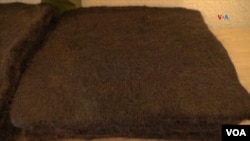Human hair, which is commonly discarded in hair salons, has been collected for a year by Diana Martínez and Jimena Villegas, founders of Matter of Trust Colombia (MOT), an initiative that seeks to create an ecological solution with hair mats to clean bodies. of water contaminated by oil spills in the country which, according to figures from the state oil company Ecopetrol, between 2019 and 2022 registered 462 incidents with hydrocarbon spills.
The Voice of America visited this enterprise located north of Bogotá, where Diana and Jimena turn locks of hair into large paintings that, due to their absorption capacity, “offer” a sustainable alternative to the synthetic materials used to collect oil spills. thanks to the “oleophilic properties of hair”.
“What happens is that hair is oleophilic, which means it has an affinity for fats and oils. So it has that affinity to collect oil and that is why it is used to collect hydrocarbons or any type of oil. “He said to the VOADiana Martínez.
How is the proccess
The process begins with the collection of large quantities of hair that, after arriving from the hairdressers, undergoes a 20-day quarantine period, and is then selected into squares that go through an embroidery process on an industrial weaving machine that compacts it.
These hair frames are then deployed in the contaminated water so that the oil is absorbed by these layers, which can then be reused in mechanical workshops.
“In the case of Oleopelo, which are used to absorb oil spills, workshop oils, for example, we have containment barriers, this product is 100% organic and we also have absorbent cloths that are 30 x 30 centimeters. It is a product that the industry, which uses oils in general for different uses, could take advantage of,” he commented to the VOAJimena Villegas, founder of MOT Colombia, about the project that develops pilots with this product in an oil field in the department of Huila, in the south-west of the country.
“It is an organic product with great potential that has a great absorption of oils, it is a process that is very economical and that in the end will allow for better disposal of waste or oil spills,” he added.
Use of hair in the agricultural industry
In addition to its success story in the oil industry where this process has achieved success stories in oil spills in the United States, Mexico and Africa, it is also used in agriculture where it is known as “Agropelo”, and it works as a blanket to prevent weeds from growing and at the same time save up to 50% of water when irrigating crops.
“Farmers, family gardens, farmers of organic crops can be greatly benefited since they will be able to reduce the use of herbicides, reduce the use of scythes, and also reduce the need for labor because the weeds will grow less and Well, agricultural crops will allow them to have healthier soil,” commented Villegas, about this other production chain that they are also betting on in their venture.
Future challenges
Although the use of human hair is a great cleaning tool for oil spills in a measure to mitigate environmental impacts in the hydrocarbon industry, solutions like these where abundant and environmentally friendly materials are used, say Diana and Jimena, great challenges to develop this process on a large scale, since a much broader logistics chain is required for its distribution; However, they specify that the first big step is awareness.
“The biggest challenge is not that we stay with the message of recycling hair, we make products based on a renewable material that is found in cities, so it has a low carbon footprint and has great characteristics that can be very useful for this industry, so we need to know and communicate the benefits that Oleopelo brings,” concluded Jimena Villegas.
Connect with the Voice of America! Subscribe to our channels Youtube, WhatsApp and to newsletter. Turn on notifications and follow us on Facebook, x and instagram.

















Add Comment